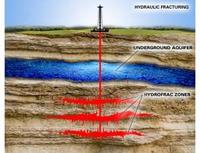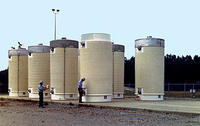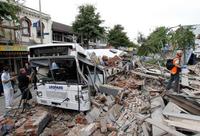-
Conflict of interests charges surround two pro-fracking studies

Two recent studies — by research institutes at the University of Buffalo and the University of Texas — on the relationship between fracking and the contamination of groundwater, offered what was claimed to be scientific, peer-reviewed research which concluded that fracking does not contribute to such contamination; an examination of the two reports reveals that they were not properly reviewed according to accepted academic standards, and that their authors, and the research institutes which sponsored them, are heavily involved with companies which conduct fracking operations; the author of the University of Texas report sits on the board of a leading fracking company, where his compensation is more than twice as large as his UT salary; he did not disclose this fact in the study — or inform UT of this connection; UT is investigating
-
-
The five biggest stories at Black Hat
The annual Black Hat Briefings conference, held last week in Las Vegas, is the world’s biggest, and arguably the most important, gathering of security researchers; here are the five biggest stories to take away from last week’s Black Hat meeting in Las Vegas
-
-
Science group: storing spent nuclear fuel in dry casks significantly safer then wet pools storage

An NRC report on the lessons of the Fukushima disaster says that storing spent nuclear fuel in wet pools is “adequate” to protect the public; a science groups says there is a significantly safer way to store the 55,000 tons of radioactive waste currently stored by the 104 nuclear power plants operating in the United States: transferring the spent fuel to dry casks
-
-
Global warming unequivocal in its advance, says NCAA expert
Global warming is unequivocal in its advance and will lead to more record-setting temperatures, says Warren Washington, a senior scientist at the National Center for Atmospheric Research; in a talk at Sandia Lab, Washington presented graph after graph showing how various atmospheric processes have combined to create stronger rainfall near the equator and more intense droughts in the subtropics, as well as sea-level rises and increased storm surges
-
-
Predictions by climate models are flawed, says MIT meteorology expert
Massachusetts Institute of Technology professor Richard Lindzen, a global warming skeptic, says that too much is being made of climate change by researchers seeking government funding; he said their data and their methods did not support their claims; for thirty years, climate scientists have been “locked into a simple-minded identification of climate with greenhouse-gas level. That climate should be the function of a single parameter (like CO2) has always seemed implausible. Yet an obsessive focus on such an obvious oversimplification has likely set back progress by decades,” Lindzen said
-
-
Large, magnitude 8 earthquakes hit New Zealand with regularity

A new study finds that very large earthquakes have been occurring relatively regularly on the Alpine Fault along the southwest coastline of New Zealand for at least 8,000 years
-
-
Studying the physics of avalanches

Snow avalanches, a real threat in countries from Switzerland to Afghanistan, are fundamentally a physics problem: What are the physical laws that govern how they start, grow, and move, and can theoretical modeling help predict them? New study offers answers
-
-
Game lets players try their hand at computer security
A new game — Control-Alt-Hack — gives teenage and young-adult players a taste of what it means to be a computer-security professional defending against an ever-expanding range of digital threats; the game’s creators will present it this week in Las Vegas at Black Hat 2012; educators in the continental United States can apply to get a free copy of the game while supplies last; it is scheduled to go on sale in the fall for a retail price of about $30
-
-
Northrop Grumman delivers Nationwide AIS to Coast Guard
Northrop Grumman has delivered its Nationwide Automatic Identification System (AIS) to the Coast Guard; the system provides a more comprehensive view of vessels bound for and navigating within U.S. ports and waterways
-
-
Capturing CO2 directly from air is chemically, economically viable
With a series of papers published in chemistry and chemical engineering journals, researchers from the Georgia Institute of Technology have advanced the case for extracting carbon dioxide directly from the air using newly developed adsorbent materials
-
-
Pulling CO2 from air feasible, if still costly, way to curb global warming
Emerging techniques to pull carbon dioxide from the air and store it away to stabilize the climate may become increasingly important as the planet tips into a state of potentially dangerous warming; lower-cost technology is a stumbling block so far
-
-
You want to report a pothole? There’s an app for that

The city of Boston offers residents a new app – Street Bump – which will automatically report potholes they encounter; all the driver has to do is install the app and place the smartphone on the dashboard or in the cup holder; the app uses the phone’s motion detector and GPS locator to report potholes
-
-
Temperature rise, CO2 follow each other closely
The greatest climate change the world has seen in the last 100,000 years was the transition from the ice age to the warm interglacial period; new research indicates that, contrary to previous opinion, the rise in temperature and the rise in the atmospheric CO2 follow each other closely in terms of time
-
-
Replacing coal with natural gas would reduce global warming
A new study finds that a gas substitution scenario, in which natural gas replaces all coal power production and any new oil-powered facilities by midcentury, would realize 40 percent of the reduction in global warming that could be achieved with a full switch to low-carbon fuel sources; this is a less costly, and more feasible, option, than switching all electricity generation immediately and aggressively to non-fossil fuel sources such as solar, wind, and nuclear
-
-
Per capita CO2 emissions in China reach EU levels
Global emissions of carbon dioxide (CO2) increased by 3 percent last year; an estimated cumulative global total of 420 billion tons of CO2 has been emitted between 2000 and 2011 due to human activities, including deforestation; scientists suggest that in order to limit the rise in average global temperature to 2°C above pre-industrial levels, cumulative CO2 emissions in the period 2000–50 cannot do not exceed 1,000 to 1,500 billion tons
-
- All
- Regional
- Water
- Biometrics
- Borders/Immig
- Business
- Cybersecurity
- Detection
- Disasters
- Government
- Infrastructure
- International
- Public health
- Public Safety
- Communication interoperabillity
- Emergency services
- Emergency medical services
- Fire
- First response
- IEDs
- Law Enforcement
- Law Enforcement Technology
- Military technology
- Nonlethal weapons
- Nuclear weapons
- Personal protection equipment
- Police
- Notification /alert systems
- Situational awareness
- Weapons systems
- Sci-Tech
- Sector Reports
- Surveillance
- Transportation
Advertising & Marketing: advertise@newswirepubs.com
Editorial: editor@newswirepubs.com
General: info@newswirepubs.com
2010-2011 © News Wire Publications, LLC News Wire Publications, LLC
220 Old Country Road | Suite 200 | Mineola | New York | 11501
Permissions and Policies
Editorial: editor@newswirepubs.com
General: info@newswirepubs.com
2010-2011 © News Wire Publications, LLC News Wire Publications, LLC
220 Old Country Road | Suite 200 | Mineola | New York | 11501
Permissions and Policies
